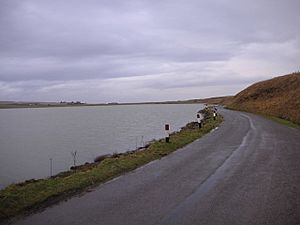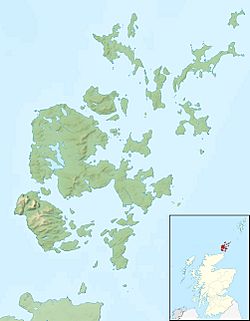Loch of Skaill facts for kids
Quick facts for kids Loch of Skaill |
|
|---|---|
| Skaill loch | |
 |
|
| Location | Mainland Orkney, Scotland |
| Coordinates | 59°02′36″N 3°19′24″W / 59.0432°N 3.3232°W |
| Type | freshwater loch |
| Primary outflows | small burn on north west shore |
| Basin countries | Scotland |
| Max. length | 1 mi (1.6 km) |
| Max. width | 0.5 mi (0.80 km) |
| Surface area | 60.9 ha (150 acres) |
| Average depth | 2 ft (0.61 m) |
| Max. depth | 4 ft (1.2 m) |
| Water volume | 14,000,000 cu ft (400,000 m3) |
| Surface elevation | 7 m (23 ft) |
The Loch of Skaill is a freshwater loch, which is the Scottish word for a lake. It's a small, somewhat triangular lake located on Mainland Orkney in Scotland. This beautiful loch is found very close to the famous Skara Brae World Heritage site and Skaill House.
Contents
Loch of Skaill: A Freshwater Gem in Orkney
Where is it Located?
The Loch of Skaill is in the area of Sandwick, Orkney on Mainland Orkney. This is one of the Orkney Islands in Scotland. It lies about 0.5 miles (0.8 km) south-east of the Bay of Skaill. This makes it very close to the ancient village of Skara Brae, a famous Stone Age settlement. It is also near the historic Skaill House.
Fishing Fun at the Loch
This loch is a popular spot for catching trout. However, only members of The Orkney Trout Fishing Association are allowed to fish here. The trout caught in the Loch of Skaill are usually quite big. On average, they weigh about 2 pounds (0.9 kg).
How the Loch was Explored
Scientists have studied the Loch of Skaill to learn more about it. In 1906, a researcher named James Murray surveyed the loch. Later, his findings were used to create detailed maps. These maps were part of a big project called The Bathymetrical Survey of Fresh-Water Lochs of Scotland. This survey took place between 1897 and 1909.
Water Flow and Drainage
A small stream, known as a "burn" in Scotland, flows out of the loch. This burn is located on the north-western shore. It drains the water from the loch into the nearby Bay of Skaill. The survey from 1906 also noted that this small burn was once used to power a mill.


